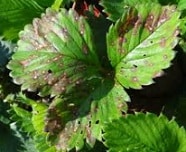Before entering fully into the definition of the term phytopathology, we are going to proceed to discover its etymological origin. In this case we can emphasize that it derives from Greek, since it is the result of the sum of several lexical components of said language:
-The “phyton” component, which can be translated as “vegetable”.
-The noun “pathos”, which is synonymous with “disease”.
-The word “logos”, which is equivalent to “treaty” or “study”.
The study of diseases suffered by plants is called phytopathology . It is a scientific discipline whose function is to diagnose and control various plant disorders .
 Phytopathology - also called plant pathology - focuses on physiological diseases, abiotic alterations and infections. However, it does not take into account the damage that animals cause to plants .
Phytopathology - also called plant pathology - focuses on physiological diseases, abiotic alterations and infections. However, it does not take into account the damage that animals cause to plants .
A long time ago, human beings considered that plant diseases were the product of a supernatural action. Since the development of phytopathology, the true causes of these diseases began to be detected, identifying viruses , fungi and other agents responsible for the problems.
At a general level, phytopathology groups diseases according to their biotic or abiotic origin. Among the biotic factors that can trigger a phytopathological problem, fungi, bacteria and viruses appear.
It is important to establish that when a plant suffers a disease due to a biotic factor, its development takes place through various phases: contamination, penetration of the pathogen in question, infection, incubation, invasion, the reproduction of the aforementioned pathogen, dissemination and survival.
Regarding abiotic factors , there are floods, droughts, wind and pollution.
In the same way, among the abiotic factors there are also other equally significant ones such as snow, nutrient deficiency, soil compaction, poor soil drainage, poisoning by high concentrations of elements such as ozone or aluminum, an excess or a clear deficiency of lighting, the use by man of certain herbicides...
Genetics , botany, biochemistry, physiology, microbiology and molecular biology are some of the fields of knowledge involved in phytopathology. An expert in these matters is called a phytopathologist : these specialists usually work in government agencies, international institutions, universities or industrial companies.
The changes that occur in pathogens and the emergence of new diseases force the constant updating of phytopathology. To treat diseases, the phytopathologist can act on the pathogen, the environment or the host plants. Phytopathology is key to the economy since a significant percentage of agricultural production is lost due to this type of problems.
The discipline that concerns us is so important that, for example, in Spain there is the Spanish Society of Phytopathology, which was created in 1981 and whose objectives include carrying out actions that promote research in plant pathology, disseminating phytopathology work or promote contact between phytopathologists in the country.
